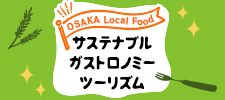Introducing the unique dialect popular in Osaka
The language generally spoken in Tokyo is the "standard Japanese" that can be understood anywhere in Japan. Japan has many unique dialects, and one of these is the "Osaka dialect," which is unique. There are phrases and words with special nuances that are only used in the Kansai region.

Ookini
"Ookini" means "thank you" in English and "thank you" in standard Japanese. This is a universal word in the Osaka dialect, so once you get used to it, it's very easy to use. If you add "Ookini" at the end of a conversation, things will go smoothly, and it may be similar to "Thank you" or "Please" in English.
Originally, it was a word used to express a quantity such as ``very much'', ``very much'', and ``Thank you very much'' and ``Thank you for your hard work'' at the bottom, but these words were gradually omitted and used independently. became. As an expression of gratitude, it is commonly used at restaurants in Osaka when saying farewell to customers who have paid their bill. Or, when a friend buys you a meal, the Osaka way of saying "Ookini, Gochisousan" is a simple way to express your gratitude. ``Ookini, summahen'' is a phrase used to express regret when something has gone wrong and the other person has forgiven you. Also, when you say, ``I'll think about it,'' in a business meeting, etc., it often means that you are saying ``I'm fine with it'' and saying no. Be careful not to mistake this for a successful deal.

Nambo
Osaka has a centuries-old history as Japan's commercial center. Osaka has a unique way of negotiating prices. "Nanbo" means "How much is it?" in standard Japanese. Shoppers pick up the item they are interested in and ask the store staff: "Wait, what is this?" (Putting an accent on the part of "What is this?")
For Osaka people, customers are also business people. In local shopping streets, you often come across customers haggling. “Uncle, what are you going to do with this?”

Shaa-nai
This phrase has a surprising amount of connotation, and when used by an adult who knows all about life's sours and sweets, it has a variety of meanings and has a lot of flavor. It is generally used when something goes in a direction you don't expect and there is no way to do it or there are no specifications. When you say, ``I see, I can't help it.'' That means ``I'm going to give up.'' Or it can mean something like, "Okay, that's how it is." It's a word that's difficult to put into standard Japanese, but if I had to put it bluntly, it's probably close in meaning to the famous Spanish phrase, "Que Sera Sera." It means to face tomorrow with a positive mindset, not to dwell on what you couldn't do today, and to go forward with a Latin Osaka rationalism.
However, Osakans also use the word ``shaanai'' when they are in a bad mood. I don't like the outcome, but there's nothing I can do to change that fate. It is a word that expresses such dissatisfaction and expresses the toughness of Osakans by saying, ``Let's not do it!'' and activating the Osakan's characteristic openness.

Bochi-bochi
Famous Osakan greetings are ``Moukari makka?'' and ``Bochibochi denna.'' The direct translation of ``Moukari Makka?'' is ``Are you making a lot of money?'', but this is a typical phrase that expresses the business spirit of Osakans. I don't particularly want to find out about the other person's financial situation, but it's more of a casual greeting like "hello" or "hello." The couplet for this greeting has been decided as ``Bochibochi denna.''
“Bochibochi.” In standard Japanese, this is ``botsubotsu.'' It's not a particularly good situation, nor is it very bad. A word that describes an intermediate state. Being snorty and angry doesn't necessarily mean anything good will happen. Take It Easy is the best. These words ooze out the cheerfulness and easy-going personality of Osakans.
Furthermore, when Osaka people leave, they often say, ``Let's just go home.'' This means "It's time to go home." Similarly, "bochi bochi ikoka" is an expression used when you skillfully invite someone to do something else without breaking their pace.

Maido
This is also a familiar greeting from Osaka merchants. This is the first greeting that a salesman, businessman, or trader greets when visiting a customer. This phrase was created by omitting "Thank you for your continued support." and "Thank you for your continued support." "Maido, maido." is sometimes used instead of "moshimoshi" not only when meeting customers face-to-face, but also over the phone. Basically, "maido" is a word used by men, but in shopping districts such as greengrocers, fishmongers, and butchers, you can often see female clerks cheerfully greeting regular customers with "maido!" You can do that.


